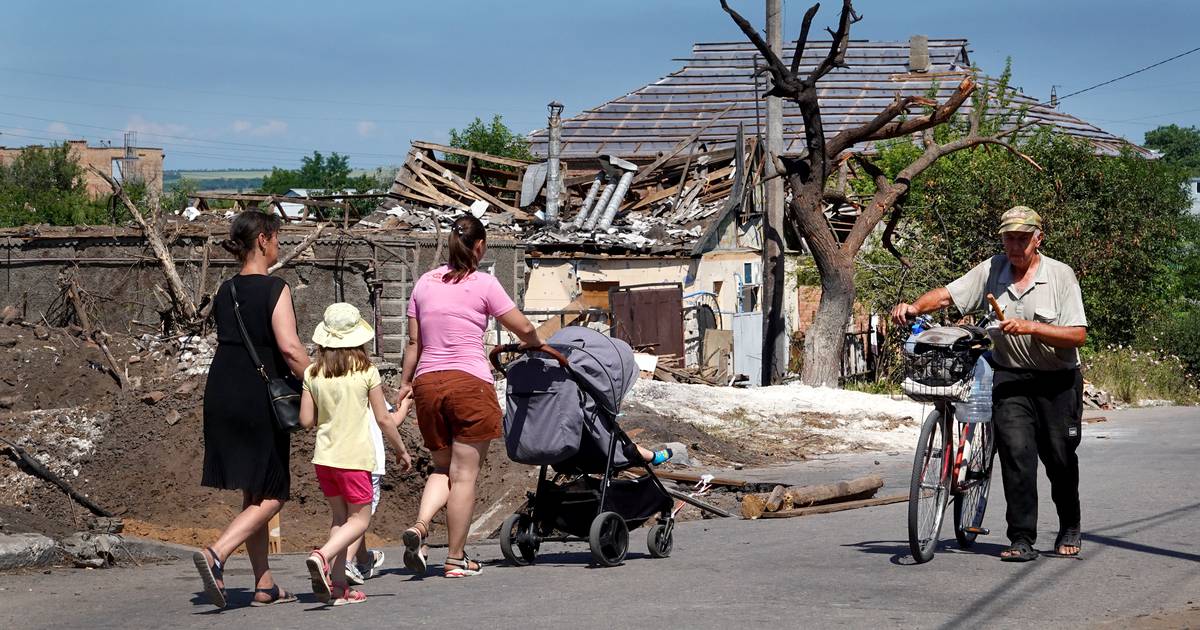[ad_1]
The war in Ukraine could drag on for years, the head of NATO said in an interview Sunday, raising questions of weakening allied support and strained morale among troops on both sides of the Russian-led conflict.
The NATO chief urged Western allies to keep up their support for Ukraine, “even if the costs are high, not only in terms of military aid, but also because of the increase in energy and food goods prices.”
“Nobody knows” how long the war might last, NATO Secretary General Jens Stoltenberg said in an interview published in the German weekly Bild am Sonntag.
“We need to be prepared for it to last for years,” he said.
:quality(70)/cloudfront-us-east-1.images.arcpublishing.com/tronc/O76PUOK7L5HZ7FAVR7RKKDAMVU.jpg)
The four months of combat are already testing morale of Russian troops as well as Ukrainian fighters, with desertions and rebellions against officers’ orders, British defense officials said.
“Combat units from both sides are committed to intense combat in the Donbas and are likely experiencing variable morale,” Britain’s Defense Ministry said in its daily assessment of the war.
“Ukrainian forces have likely suffered desertions in recent weeks,” it said, adding, “Russian morale highly likely remains especially troubled.”
“Cases of whole Russian units refusing orders and armed standoffs between officers and their troops continue to occur,” the assessment said.
The Ukrainian Main Intelligence Directorate released what it said were intercepted telephone calls of Russian soldiers complaining about poor equipment, conditions at the front lines and lack of personnel, according to a report by the Washington-based Institute for the Study of War.
:quality(70)/cloudfront-us-east-1.images.arcpublishing.com/tronc/J6RRDKWVL5DITBW2O37UFYWBYU.jpg)
British Prime Minister Boris Johnson warned Saturday that “a bit of Ukraine fatigue is starting to set in around the world” a day after he made a surprise visit to Kyiv. Johnson met with Ukrainian President Volodymyr Zelenskyy and offered ongoing aid and military training.
Even Pope Francis, who has spoken out against arms buildups, called for ongoing support for the besieged Ukraine.
“Let’s not forget the martyred Ukrainian people in this moment,” Francis said to the crowd gathered on Sunday at St. Peter’s Square in Vatican City.
The pope asked his listeners to ask themselves, “What did I do today for the Ukrainian people?”
In eastern Ukraine, the main focus of Russia’s attacks for more than two months, heavy artillery by both sides was bombarding areas to the north, east and south of the city of Sievierodonetsk, but with little change in the front lines, Britain’s Defense Ministry said.
“It is a very difficult situation in Sievierodonetsk, where the enemy in the middle of the city is conducting round-the-clock aerial reconnaissance with drones, adjusting fire, quickly adjusting to our changes,” Luhansk Gov. Serhiy Haidai said on Telegram.
Russian and separatist forces have taken control of Metolkine, a nearby settlement to the east of Sievierodonetsk, Russia’s Defense Ministry said.
:quality(70)/cloudfront-us-east-1.images.arcpublishing.com/tronc/DB4UWLPZXRCELLWGD7G6CYQFX4.jpg)
About 33 miles southwest of the twin cities of Lysyhansk and Siervierodonetsk, Russian artillery was pounding the city of Bakhmut.
Nevertheless, residents were finding ways to live their daily lives, like shopping in markets that reopened recently.
“In principle, it can be calm in the morning″ said Bakhmut resident Oleg Drobelnnikov. “The shelling starts at about 7 or 8 in the evening.”

Breaking News
As it happens
Get updates on the coronavirus pandemic and other news as it happens with our free breaking news email alerts.
“You can buy food at small farmer markets,″ the teacher said.
Institutions like schools are still closed, he said, adding, “There is no work here.”
In Germany, where the Russian gas company Gazprom has cut its supplies, the country will limit use of gas for electricity production amid concerns about shortages, Economy Minister Robert Habeck said Sunday.
Germany will try to make up for shortages by burning more coal, Habeck said, conceding that the option to use a more polluting fossil fuel was unfortunate.
“That’s bitter, but it’s simply necessary in this situation to lower gas usage,” he said.
In Italy, where Gazprom also has reduced its supplies, “restrictions” on gas use might become necessary, but the country should make it through winter with gas bought from other sources, the head of Italian energy giant Eni said Saturday.
With News Wire Services
[ad_2]


































































